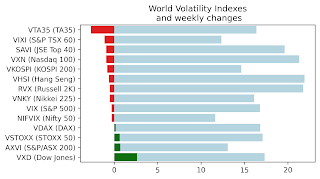Before 2016, options expirations were available just once per week, typically on Fridays. This year CBOE launched SPX options expiring on Mondays and Wednesdays, allowing us to calculate implied volatility over the 48 hours from the close of Monday, Nov 7 to close on Wednesday, Nov 9. Since voting will take place on Tuesday, Nov 8, the results will probably be tallied to statistical certainty by the close of trading on Wednesday, barring the like of 2000 election debacle.
Looking at options data I calculated table below.
| Contract | From | Until (Expiration) | Implied Move |
|---|---|---|---|
| SPX.XO | 10/31/2016 | 11/2/2016 | 1.20% |
| SPX.XO | 11/2/2016 | 11/4/2016 | 1.16% |
| SPX.XO | 11/4/2016 | 11/7/2016 | 0.85% |
| SPX.XO | 11/7/2016 | 11/9/2016 | 2.17% |
| SPX.XO | 11/9/2016 | 11/11/2016 | 1.22% |
| SPX.XO | 11/11/2016 | 11/14/2016 | 0.79% |
| SPX.XO | 11/14/2016 | 11/16/2016 | 1.08% |
| SPXPM.XO | 11/16/2016 | 11/18/2016 | 1.10% |
| SPX.XO | 11/18/2016 | 11/21/2016 | 0.72% |
| SPX.XO | 11/21/2016 | 11/23/2016 | 0.93% |
| SPX.XO | 11/23/2016 | 11/25/2016 | 0.45% |
| SPX.XO | 11/25/2016 | 11/28/2016 | 1.09% |
| SPX.XO | 11/28/2016 | 11/30/2016 | 1.12% |
As expected, the 48-hour period over election day shows the highest implied forward vol of 2.17%, about twice what we would expect for non-election trading period. Alternatively, we can say that market expects about 1.31% election event vol, and “regular” volatility of 0.79% per day. I realize that it is annualized vol of just 12.72%, which is much smaller than VXST but my number is the average through the end of November and by construction excludes election vol .
Also, today (at the time of writing) markets are higher, and vol indexes are higher - this is not surprise as VIX will rise into the election simply on "closer jump" effect.



